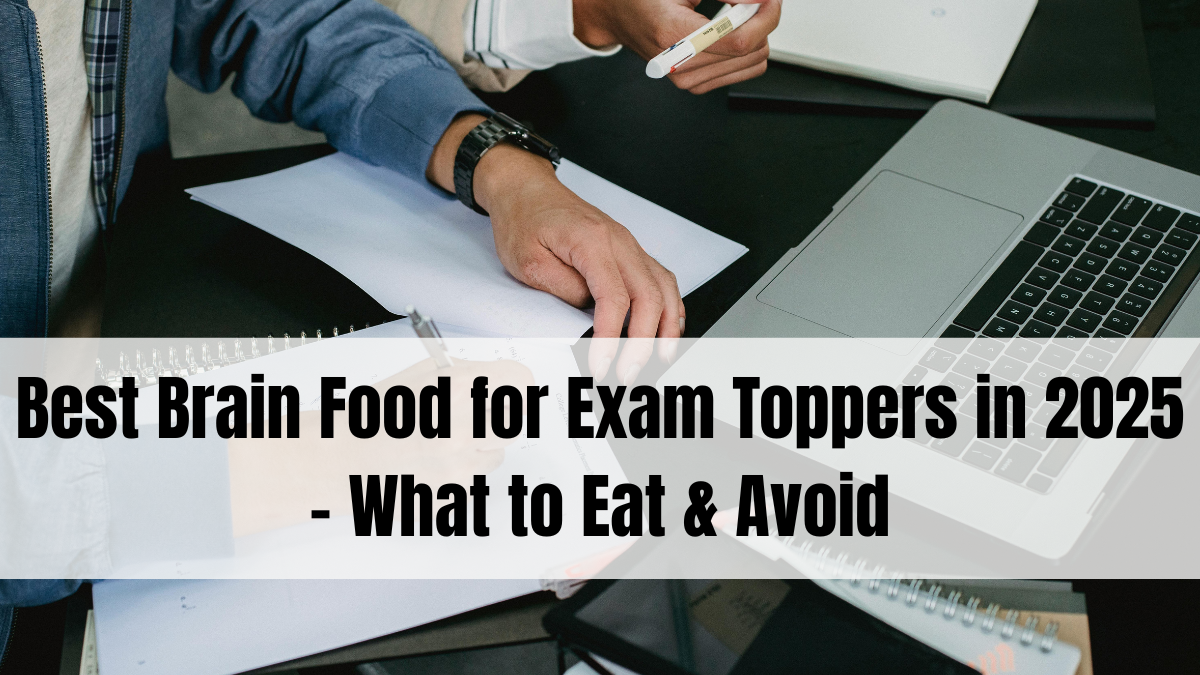Preparing for exams requires more than just hard work; it demands optimal brain function supported by the right nutrition. As students and aspirants gear up for competitive exams in 2025, understanding brain food for exams 2025 can significantly enhance concentration, memory, and mental stamina.
This article outlines the best foods to include in your diet, those to avoid, and nutrition tips to power your study sessions effectively.

Why Nutrition Matters for Exam Preparation
The brain consumes about 20% of the body’s energy, relying heavily on glucose and nutrients for cognitive functions. Proper nutrition:
-
Improves focus and attention span
-
Enhances memory formation and recall
-
Reduces fatigue and mental stress
-
Supports overall brain health and mood regulation
Neglecting diet can lead to brain fog, decreased alertness, and poor exam performance.
Top Brain Foods to Include in Your Diet
-
Fatty fish: Rich in omega-3 fatty acids (DHA and EPA) that support neuron function and memory. Examples: salmon, mackerel, sardines.
-
Nuts and seeds: Provide vitamin E, antioxidants, and healthy fats. Walnuts and flaxseeds are especially beneficial.
-
Berries: Blueberries, strawberries, and blackberries have flavonoids that improve brain plasticity.
-
Whole grains: Brown rice, oats, and whole wheat release glucose steadily, ensuring sustained energy.
-
Leafy greens: Spinach, kale, and broccoli are packed with vitamins, minerals, and antioxidants.
-
Dark chocolate: Contains flavonoids and caffeine that boost alertness and mood (in moderation).
-
Eggs: Provide choline, essential for memory and neurotransmitter production.
-
Hydration: Drinking plenty of water is vital for maintaining cognitive functions.
Incorporate these foods regularly for best results.
Foods and Habits to Avoid Before Exams
-
Excessive sugar: Causes energy crashes and impairs concentration.
-
High-fat junk food: Slows brain function and causes lethargy.
-
Caffeine overload: Leads to jitters and anxiety when consumed excessively.
-
Skipping meals: Depletes glucose levels, reducing mental sharpness.
-
Late-night heavy meals: Interfere with sleep quality, impacting memory consolidation.
Maintaining balanced eating habits is crucial.
Sample Daily Nutrition Plan for Exam Days
-
Breakfast: Oatmeal topped with berries and nuts; a glass of milk or herbal tea.
-
Mid-morning snack: A handful of mixed nuts or a fruit smoothie.
-
Lunch: Brown rice or whole wheat chapati with spinach dal and grilled fish or tofu.
-
Afternoon snack: Dark chocolate square and green tea.
-
Dinner: Vegetable stir-fry with eggs or legumes and quinoa.
-
Hydration: At least 8 glasses of water throughout the day.
Consistency in diet supports sustained cognitive performance.
Additional Tips for Enhancing Brain Power
-
Include regular physical exercise to improve blood flow to the brain.
-
Practice mindfulness or meditation to reduce exam stress.
-
Get 7-8 hours of quality sleep daily to consolidate memory.
-
Avoid multitasking during study sessions to maintain focus.
Nutrition combined with healthy lifestyle habits creates the ideal environment for exam success.
FAQs
What are the best brain foods for exam preparation?
Fatty fish, nuts, berries, whole grains, leafy greens, eggs, and dark chocolate in moderation.
How does hydration affect brain function during exams?
Proper hydration maintains concentration, reduces fatigue, and supports cognitive processes.
Can caffeine help during exams?
Moderate caffeine intake can improve alertness, but excessive consumption causes anxiety.
Should I avoid sugar during exam preparation?
Yes, high sugar intake leads to energy crashes and hampers focus.
How important is sleep in relation to brain food and exam success?
Sleep is crucial for memory consolidation and mental clarity; it complements good nutrition.
Click here to know more.
